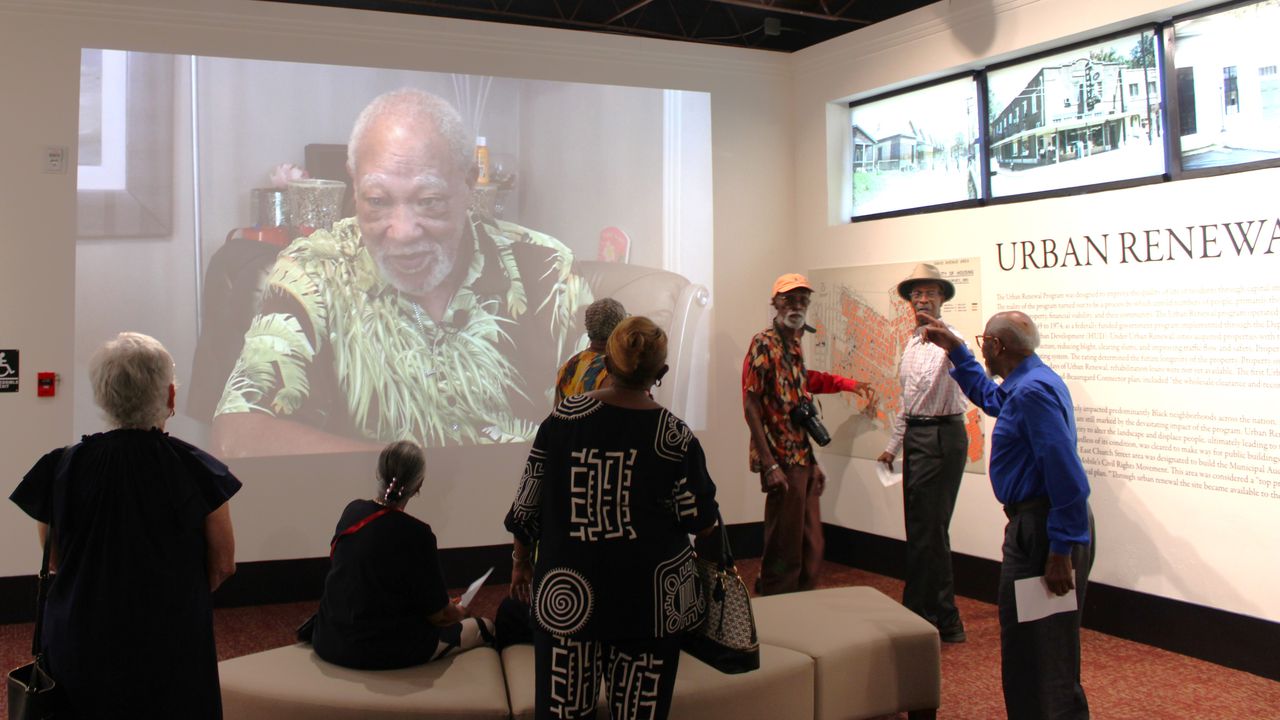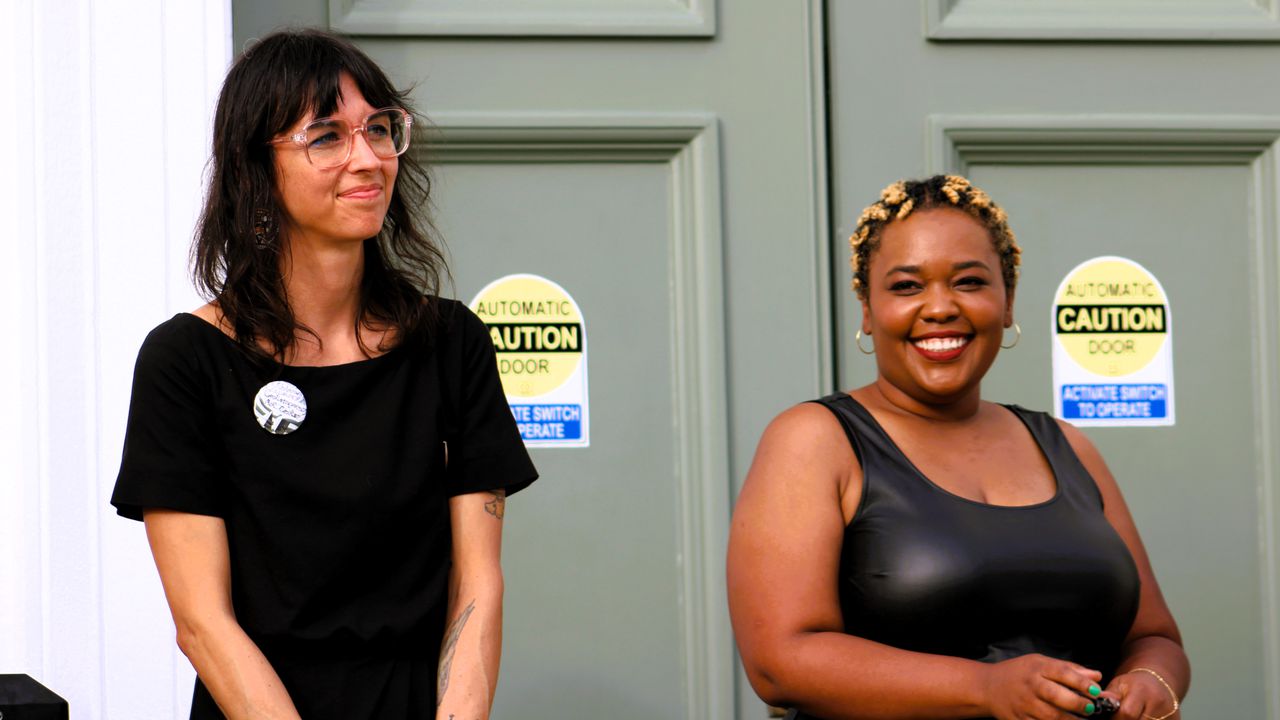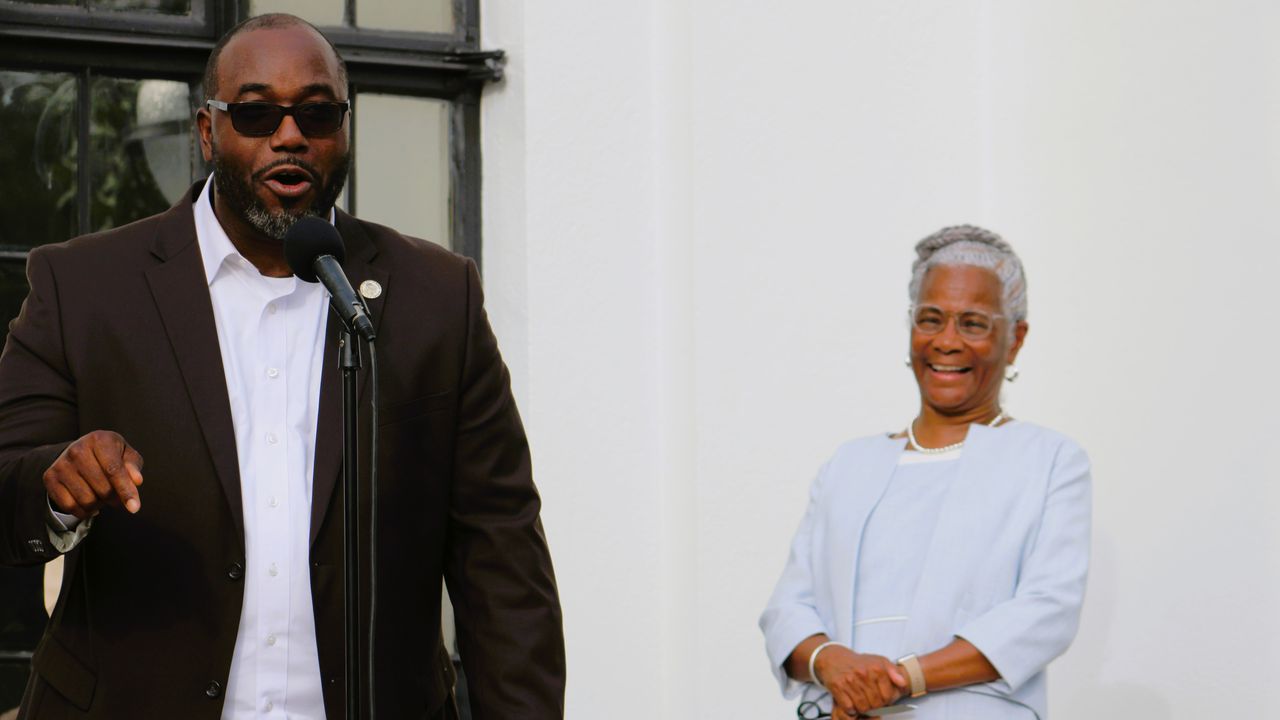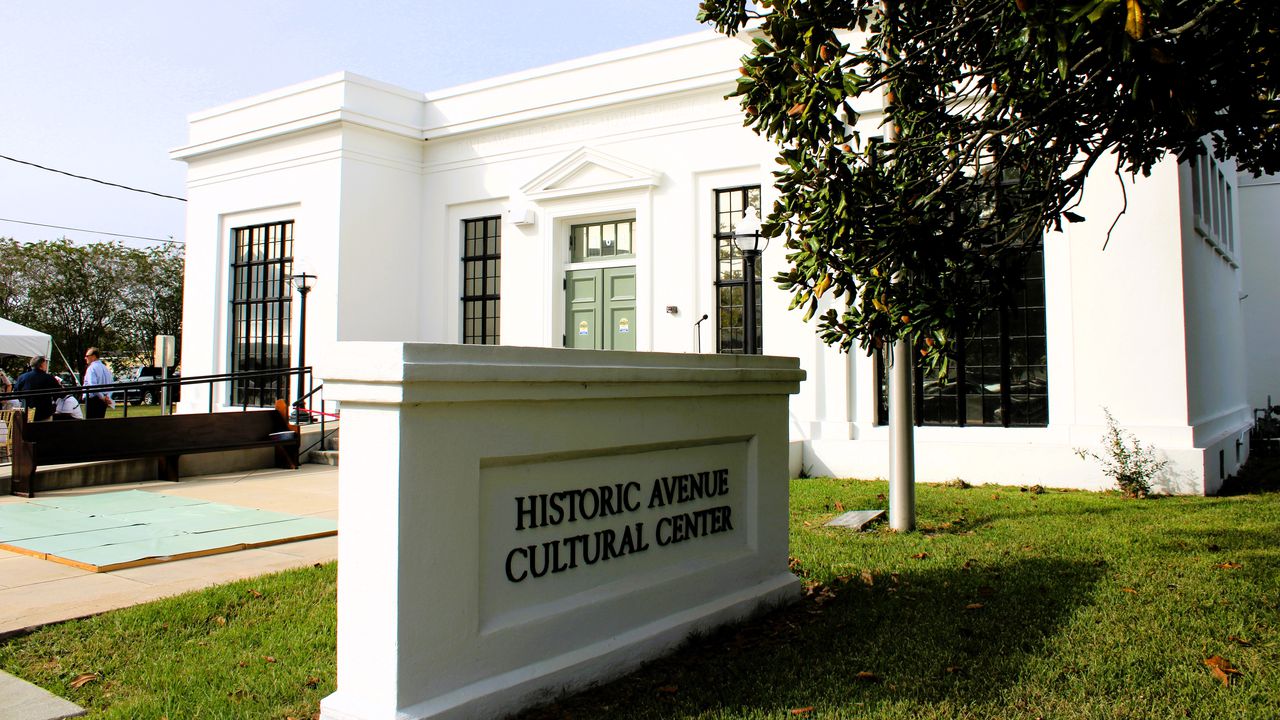In Mobile, segregation-era library reborn as a community cultural center
For many years, the library building known as the Davis Avenue Branch seemed destined to stand as nothing more than a monument to Mobile’s segregated past. In a jubilant moment on Wednesday, county and city leaders reopened it as a cultural center dedicated to the proud history and hopeful future of a community once known as “The Avenue.”
Wednesday’s fanfare – a ribbon cutting, the opening of a historical exhibition and a block party – capped at least five years of work on an initiative spearheaded by Mobile County Commissioner Merceria Ludgood. But the history at 564 Dr. Martin Luther King Jr. Ave. runs all the way back to the late 1920s and early 1930s.
In that era, Mobile built its Ben May Main Library. That building – one of several city landmarks designed by architect George Bigelow Rogers – was off-limits to Black patrons. The city had Rogers design a scaled-down copy for their use. It was built on what was then Jefferson Davis Avenue, named for the president of the Confederacy.
In the 1930s, Mobile opened a branch library for Black patrons, who were blocked from using the main library. The building has been renamed the Historic Avenue Cultural Center, honoring the thriving Black business community that once existed along Jefferson Davis Avenue.Lawrence Specker | [email protected]
At the time, and for the next 40 years, “The Avenue” was home to a thriving Black business district. For the city’s Black residents, it was a district to shop, dine and socialize, enjoying a freedom denied to them elsewhere. In a painful irony, desegregation brought a rapid decline to the district. Davis’ name faded away, replaced by that of King, but so did the heyday of the Avenue community.
No longer needed, at least for its intended purpose, the Davis Avenue Branch ceased to function as a library. The building was used for a time by the library system’s technical services department, and for a decade or so starting in 2005 it was operated by a private tenant as the National African-American Archives. Though it is on the National Register of Historic Places, it sat empty after that.
It was fall 2018 when the Mobile County Commission approved a deal to lease the building from the city at $1 a year for 50 years, and then to commit $500,000 to renovations. Ludgood said the county would build on some preservation and renovation work the city had already done in order to turn the building into a cultural center, though she hadn’t yet determined exactly what that would mean. Supporters included Mobile City Councilman Levon Manzie, who said he was eager to see “that the community’s vision is implemented and that building remains a vital and functioning part of the culture of the city of Mobile for decades to come.”
On Wednesday, with the Excelsior Band playing outside, onlookers got their first chance to behold what is now known as the Historic Avenue Cultural Center. Though obviously far smaller than the main library, the building provides a classic, high-ceilinged interior with at least two rooms that could be used for small gatherings and a large main space suitable for exhibitions or performances.

Patrons take in an oral history program compiled by former TV news anchor Renee Dials for the “Remembering the Avenue” exhibition at the Historic Avenue Cultural Center.Lawrence Specker | [email protected]
That main hall is occupied by “Remembering the Avenue,” a multimedia exhibition from first-time curator Jada Jones. Jones, described as a public historian, worked with organizational support from the Alabama Contemporary Art Center and a research team including poet and independent archivist Michael Campbell; Mobile native Eric Finley a past president of the Mobile Area Mardi Gras Association; retired WALA-TV 10 anchor Renee Dials; and Sheila Flanagan, retired assistant director of the History Museum of Mobile. Jones said a key resource had been “Avenue,” a book published by Paulette Davis-Horton in the ‘90s.
Under the themes of “Pride, Protest and Possibility,” the exhibition depicts many of “The Avenue’s” glories, such as a roster of its many businesses; an oral history video compiled by Dials; and an account of some of the challenges that eroded the community, such as the way the “urban renewal” movement disrupted Black communities in the ‘50s, ‘60s and ‘70s. It also provokes thought about what the area could become.
Jones, who holds a bachelor’s degree in cultural anthropology and a master’s in history, said her approach to the exhibition was informed by the fact that she grew up in the Campground district of Mobile.

Jada Jones, right, curator of “Remembering the Avenue,” and elizabet elliott, executive of the Alabama Contemporary Art Center, are seen at the grand opening of the Historic Avenue Cultural Center.Lawrence Specker | [email protected]
“This is The Avenue, but the area also encompasses the Campground, the Bottom, what was Orange Grove,” said Jones, standing on the steps of the center. “So basically this community was born out of Jim Crow segregation. The community was self-sustaining, it thrived, even in the face of oppression. Basically we just want to remember The Avenue and celebrate the people, the history and the culture.”
It was clear that for many present at Wednesday’s ribbon-cutting, those memories were personal and vivid. Mobile City Councilman William Carroll drew cheers and exclamations as he told the crowd he’d missed out on having a meal at this Avenue establishment or that one, but that he had been on the scene in time to buy butter cookies here or have his hair cut there. Each time he named a long-gone business, onlookers affirmed that they knew it well.
“So many people keep the legacy and the story of The Avenue and that community alive,” Carroll said. “With the preservation of this building and what’s in it, the preservation of the history that’s in it, it keeps our story alive. And that is the most precious goal we can have, to continue the stories, the legacies, of communities that were there. Even better so, to be a catalyst for the revitalization of a community that’s been underserved for a while.”

Mobile County Commissioner Merceria Ludgood laughs as City Councilman William Carroll makes remarks at the grand opening of Mobile’s Historic Avenue Cultural Center on Oct. 4, 2023Lawrence Specker | [email protected]
Carroll singled out Ludgood for praise, calling her the “godmother” of his council district. So did Mobile Mayor Sandy Stimpson, who held up her leadership as an example of the power of a vision.
For her part, Ludgood praised elizabet elliot, executive director of the Alabama Contemporary Art Center. “She was the person we approached about how to make this real,” said Ludgood. “She drank the Kool-Aid, and now she is a really outstanding partner here.”
Ludgood said that plans include creating a research space at the Center where people can learn more about African-American contributions to Mobile. Specifically, she said, an effort is under way to collect, catalog and digitize the various newspapers that served the city’s Black population, such as The Inner City News, The New Times and the Mobile Beacon. She also wanted to catalog works “by and about African-Americans” with ties to Mobile. “What we’re trying to do is respond to all the people who really just don’t know,” she said. “They have no idea, and may have assumed that Mobile lay dormant throughout the Civil Rights movement.”
Among the materials available on Wednesday was a 2023-2024 program schedule listing celebrations, public forums and music performances through October 2024, when a 1-year anniversary block party is planned. For more information on the current exhibition, visit www.alabamacontemporary.org/events/the-avenue.
Related:
Mobile segregation landmark could be reborn as ‘cultural venue’
